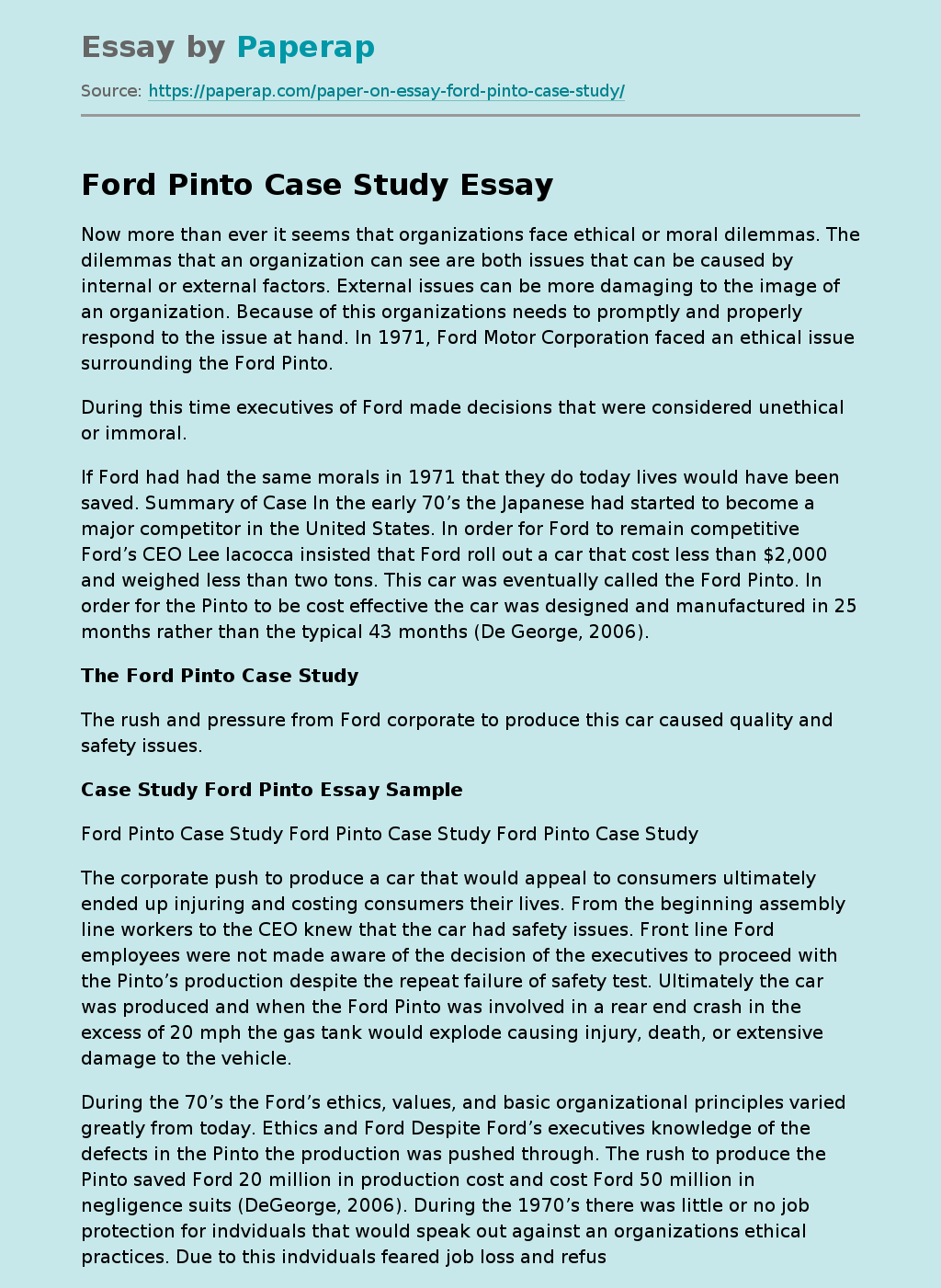Ford Pinto Case Study
Now more than ever it seems that organizations face ethical or moral dilemmas. The dilemmas that an organization can see are both issues that can be caused by internal or external factors. External issues can be more damaging to the image of an organization. Because of this organizations needs to promptly and properly respond to the issue at hand. In 1971, Ford Motor Corporation faced an ethical issue surrounding the Ford Pinto.
During this time executives of Ford made decisions that were considered unethical or immoral.
If Ford had had the same morals in 1971 that they do today lives would have been saved. Summary of Case In the early 70’s the Japanese had started to become a major competitor in the United States. In order for Ford to remain competitive Ford’s CEO Lee Iacocca insisted that Ford roll out a car that cost less than $2,000 and weighed less than two tons. This car was eventually called the Ford Pinto. In order for the Pinto to be cost effective the car was designed and manufactured in 25 months rather than the typical 43 months (De George, 2006).
The Ford Pinto Case Study
The rush and pressure from Ford corporate to produce this car caused quality and safety issues.
Case Study Ford Pinto Essay Sample
Ford Pinto Case Study Ford Pinto Case Study Ford Pinto Case Study
The corporate push to produce a car that would appeal to consumers ultimately ended up injuring and costing consumers their lives. From the beginning assembly line workers to the CEO knew that the car had safety issues.
Front line Ford employees were not made aware of the decision of the executives to proceed with the Pinto’s production despite the repeat failure of safety test. Ultimately the car was produced and when the Ford Pinto was involved in a rear end crash in the excess of 20 mph the gas tank would explode causing injury, death, or extensive damage to the vehicle.
During the 70’s the Ford’s ethics, values, and basic organizational principles varied greatly from today. Ethics and Ford Despite Ford’s executives knowledge of the defects in the Pinto the production was pushed through. The rush to produce the Pinto saved Ford 20 million in production cost and cost Ford 50 million in negligence suits (DeGeorge, 2006). During the 1970’s there was little or no job protection for indviduals that would speak out against an organizations ethical practices. Due to this indviduals feared job loss and refused to speak up.
If Ford was faced today with a similar situation to the Ford Pinto situation the outcome would be gravley different. In today’s society there are mesausres that have been put into place that will protect an indviudal if they choose to speak up on the practices of an organization. The National Highway Traffic Safety Administration (NHTSA) has also been developed to ensure the safety of the cars and drives on the roads of the United States. This administrations does not only inforce rules and regulation, but it encourages car manfactures to keep moral and ethical standards high.
Conclusion Ultimately the decision made by executives in the Ford 1972 Pinto Case was immoral and cost individuals their lives. The lack of ability for individuals to feel comfortable to speak up and the pressure that executive received caused an immoral issue that could have been prevented. Over the years Ford has learned from their mistake and has not had another issue that compares to the Pinto Case.
References DeGeorge, R. T. (2006). Business Ethics. In R.
T. DeGeorge, Business Ethics (p. Ch. 12 : Whistle Blowing). Prentice Hall Inc.
Ford Pinto Case Study. (2019, Dec 05). Retrieved from https://paperap.com/paper-on-essay-ford-pinto-case-study/

